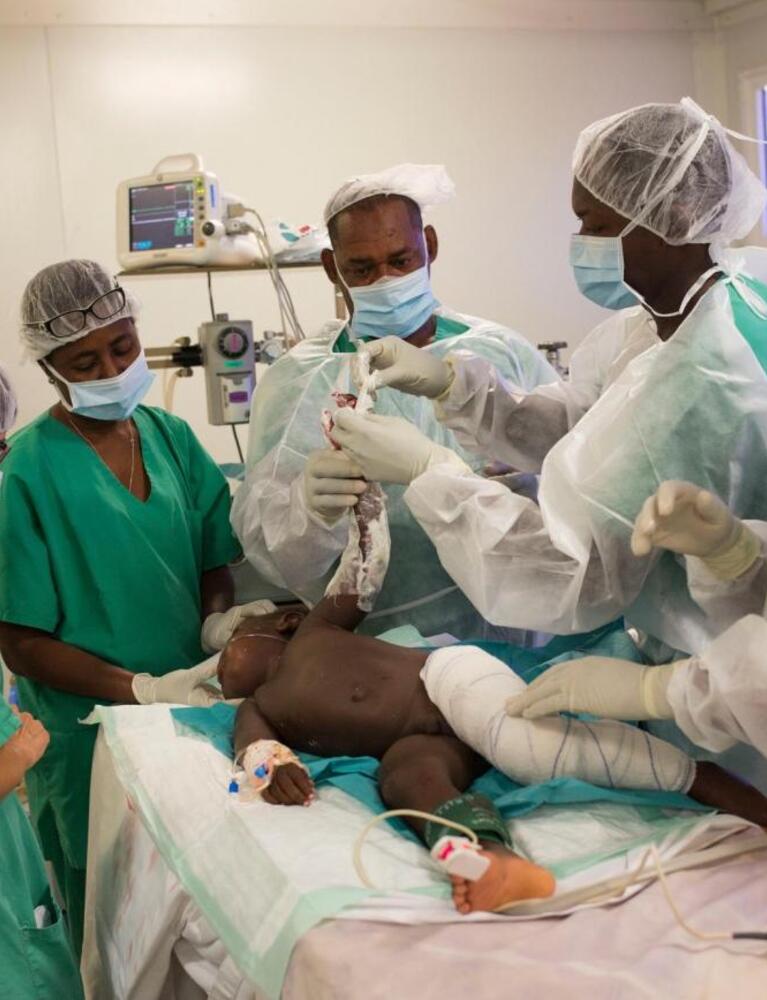Profile
DIPLOMA
- in general surgery, diploma or specialized in pediatric surgery
- current matriculation to medical council
EXPERIENCE
- 2 years (not including internships) after obtaining your diploma or 2 years of full time practice if you do not have the specialized diploma
AVAILABILITY
- 6 to 8 weeks minimum
LANGUAGE
- basic knowledge of English
The surgeon is responsible for surgical procedures and postoperative surgical care, in accordance with MSF protocols.
In 2021, 40,820 interventions were performed on 17,888 patients. 2021 is a record year in terms of interventions, exceeding 2019, which also passed the 40,000 procedures. MSF Surgical activities take place in 14 countries with 1 to 5 surgical projects per country.
There are 119 departures in 2021, including 37 first assignments (FA) (compared to 82 departures in 2020, including 22 FA). The international surgeons come from 29 countries, representing the 5 continents.The detailed statistics by specialty are as follows: 49 departures of general surgeons (including 8 FA), 28 orthopedic surgeons (including 12 FA), 1 vascular surgeon, 8 plastic surgeons (including 1 FA), 9 pediatric surgeons (including 3 FA), and 24 obgyns (including 4 specializing in oncology and 13 FAs among all gynecologists).
Our project in Lebanon runs within a public hospital in Zahle, which is in the Beqaa plains. Patients (15 years and younger) that require medical, surgical or intensive care are referred to MSF by another NGO.The hospital has an imagery department equipped with a scanner, as well as dialysis. The program opened October, 19, 2017, with outpatient and short-stay surgeries (hernia, ectopia). More specialized pediatric surgeries will be able to be performed in the near future (according to the needs: ear, nose and throat, plastic surgery, or orthopedic).
Our second pediatric surgery project is in Monrovia, the capital of Liberia, situated in a hospital completely rehabilitated and run by MSF. The hospital currently provides pediatric care including intensive care and surgery should begin there in early 2018. Liberia is a country that does not have any pediatric surgeons and where mortality during operations of children under 15 years is particularly high. Therefore, in addition to our basic surgical program, we will provide a significant training program in an effort to integrate pediatric surgery into the country's health care system.
ACTIVITIES:
Being part of an on-call rotation at night is required in order to guarantee 24 hour care.
Pre-operative Care
- Ensure that surgical consultations are performed.
- Inform the patient and their family about the illness and the surgery proposed.
- Ensure that the patient authorization form to perform surgery is signed by the child's family.
- Evaluate the level of risk for the operation in conjunction with the anesthetist.
Surgery
- Perform both planned andemergency surgical interventionsaccording to MSF protocols
- Coordinate surgical activities and control the quality of the interventions
- Oversee the responsible use of material during surgical interventions
- Write up a report of the operation after each surgery
Post-Operative Care
- Ensure the patients receive the proper care according to their pathologies (infectious, non-infectious, ortho, burns, etc.)
- Working in collaboration with the anesthetist, OR nurse and department supervisor, ensure follow-up visits with the patient within the surgical department.
- Guarantee MSF Protocols are applied (antibiotic treatment; dressing protocols) and the responsible use of drugs.
- Working with the anesthetist, provide good oversight of pre- and post-operative prescriptions
- In collaboration with the healthcare team, ensure ancillary services follow the surgical patients in the hospital.
Hygiene
- Ensure that hygiene regulations are respected (by both your colleagues and you) with regards to patient and personnel protection within the operating room.
- Know the steps to take in case of blood exposure accidents.
Data Collection
- Working with the anesthetist, collect quantitative surgical and anesthetist data, verify or input the data into our internal database.
- With the anesthetist, the medical manager, the hospital director and/or the project coordinator, participate in the editing and analysis of morbidity and mortality reports.
Work with other Departments
- Participate in medical meetings, in particular morbidity-mortality meetings concerning operations.
- Work in direct collaboration with the Emergency Department and the Intensive Care Unit
- Provide support in other departments as neededTraining and Development
- Ensure the continued training and development of the surgical team (national staff surgeons in particular) based on MSF protocols and guidelines.
- May be asked to assist in training and development (ex:urgent care)
- Medical confidentiality must be respected at all times.
Care and attention must be employed, and the supervisor must be informed of any medical errors.



